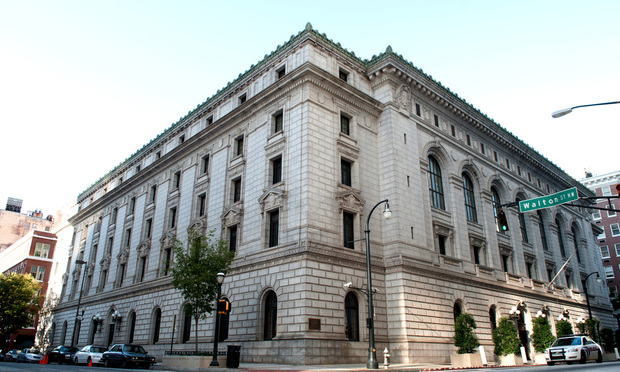Reluctant 11th Circuit Upholds Injunction Against Alabama Abortion Law
Chief Judge Ed Carnes wrote the panel must apply an “aberration” of constitutional law in applying Supreme Court precedent.
August 22, 2018 at 05:53 PM
4 minute read
 Elbert P. Tuttle Courthouse, U.S. Court of Appeals for the Eleventh Circuit, Atlanta. (Photo: Rebecca Breyer)
Elbert P. Tuttle Courthouse, U.S. Court of Appeals for the Eleventh Circuit, Atlanta. (Photo: Rebecca Breyer)
The U.S. Court of Appeals for the Eleventh Circuit upheld a lower court's injunction against Alabama's law prohibiting some “dilation and extraction” abortions, but two of the judges made clear they did so only because U.S. Supreme Court precedent mandates the ruling.
The first sentence in Chief Judge Ed Carnes' majority opinion published Wednesday is blunt: “Some Supreme Court justices have been of the view that there is constitutional law and then there is the aberration of constitutional law relating to abortion. If so, what we must apply here is the aberration.”
A short concurrence penned by Judge Joel Dubina notes that, while the opinion correctly analyzes the law, he agrees with U.S. Supreme Court Justices Clarence Thomas and the late Antonin Scalia that the key laws permitting legal abortion, including the seminal 1973 ruling in Roe v. Wade and 1992's Planned Parenthood v. Casey, have no basis in the Constitution.
“The problem I have, as noted in the Chief judge's opinion, is that I am not on the Supreme Court, and as a federal appellate judge, I am bound by my oath to follow the all of the Supreme Court's precedents, whether I agree with them or not,” Dubina wrote.
The third member of the panel, Judge Leslie Abrams of Georgia's Middle District, sitting by designation, wrote that she concurred in judgment only. Abrams, who was nominated to the bench by President Barack Obama, is the sister of Georgia gubernatorial candidate Stacey Abrams.
The law at issue was passed by Alabama in 2016 and involves what it termed “dismemberment abortion.”
“That name is more accurate because the method involves tearing apart and extracting piece-by-piece from the uterus what was until then a living unborn child,” Carnes wrote. “This is usually done during the 15th to 18th week stage of development, at which time the unborn child's heart is already beating.”
In an effort to “make the procedure more humane,” he wrote, the Alabama law required that the fetus be killed before the extraction.
“Killing an unborn child and then dismembering it is permitted; killing an unborn child by dismembering it is not,” Carnes wrote.
Violations of the law could subject an abortion provider to a prison term of up to two years and $10,000 in fines.
The West Alabama Women's Center, Alabama Women's Center and their medical directors challenged the law as unconstitutional and sought an injunction.
Among their arguments were that the methods Alabama proposed to kill a fetus prior to extraction, including cutting its umbilical cord, or injecting a fatal doses of potassium chloride or the digoxin into the fetus, were both unreliable and dangerous, and that no safe and effective ways for complying with law existed.
Judge Myron Thompson of Alabama's Middle District agreed, and in 2016 he issued a preliminary injunction, which Alabama appealed.
After weighing both sides' arguments, Carnes wrote that all of the findings “support the conclusion that the law would 'place a substantial obstacle'”in the path of women seeking abortions before the fetus attains viability, which Supreme Court precedent says are permitted.
“In our judicial system,” Carnes wrote, “there is only one Supreme Court, and we are not it.”
“Our role is to apply the law the Supreme Court has laid down to the facts the district court found. The result is that we affirm the judgment of the district court.”
This content has been archived. It is available through our partners, LexisNexis® and Bloomberg Law.
To view this content, please continue to their sites.
Not a Lexis Subscriber?
Subscribe Now
Not a Bloomberg Law Subscriber?
Subscribe Now
NOT FOR REPRINT
© 2025 ALM Global, LLC, All Rights Reserved. Request academic re-use from www.copyright.com. All other uses, submit a request to [email protected]. For more information visit Asset & Logo Licensing.
You Might Like
View All
On The Move: Energy Infrastructure Pro Joins Moore & Van Allen, Adams & Reese Changes Atlanta Leadership
6 minute read
40% Contingency: A New Ruling Just Cost This Plaintiff Team $827K in Legal Fees
6 minute read

'David and Goliath' Dispute Between Software Developers Ends in $24M Settlement
Trending Stories
- 1DOJ Files Antitrust Suit to Block Amex GBT's Acquisition of Competitor
- 2K&L Gates Sheds Space, but Will Stay in Flagship Pittsburgh Office After Lease Renewal
- 3US Soccer Monopoly Trial Set to Kick Off in Brooklyn Federal Court
- 4NY AG James Targets Crypto Fraud Which Allegedly Ensnared Victims With Fake Jobs
- 5The 'Motherhood Advantage' in Law: Time to Flip the Script
Who Got The Work
Michael G. Bongiorno, Andrew Scott Dulberg and Elizabeth E. Driscoll from Wilmer Cutler Pickering Hale and Dorr have stepped in to represent Symbotic Inc., an A.I.-enabled technology platform that focuses on increasing supply chain efficiency, and other defendants in a pending shareholder derivative lawsuit. The case, filed Oct. 2 in Massachusetts District Court by the Brown Law Firm on behalf of Stephen Austen, accuses certain officers and directors of misleading investors in regard to Symbotic's potential for margin growth by failing to disclose that the company was not equipped to timely deploy its systems or manage expenses through project delays. The case, assigned to U.S. District Judge Nathaniel M. Gorton, is 1:24-cv-12522, Austen v. Cohen et al.
Who Got The Work
Edmund Polubinski and Marie Killmond of Davis Polk & Wardwell have entered appearances for data platform software development company MongoDB and other defendants in a pending shareholder derivative lawsuit. The action, filed Oct. 7 in New York Southern District Court by the Brown Law Firm, accuses the company's directors and/or officers of falsely expressing confidence in the company’s restructuring of its sales incentive plan and downplaying the severity of decreases in its upfront commitments. The case is 1:24-cv-07594, Roy v. Ittycheria et al.
Who Got The Work
Amy O. Bruchs and Kurt F. Ellison of Michael Best & Friedrich have entered appearances for Epic Systems Corp. in a pending employment discrimination lawsuit. The suit was filed Sept. 7 in Wisconsin Western District Court by Levine Eisberner LLC and Siri & Glimstad on behalf of a project manager who claims that he was wrongfully terminated after applying for a religious exemption to the defendant's COVID-19 vaccine mandate. The case, assigned to U.S. Magistrate Judge Anita Marie Boor, is 3:24-cv-00630, Secker, Nathan v. Epic Systems Corporation.
Who Got The Work
David X. Sullivan, Thomas J. Finn and Gregory A. Hall from McCarter & English have entered appearances for Sunrun Installation Services in a pending civil rights lawsuit. The complaint was filed Sept. 4 in Connecticut District Court by attorney Robert M. Berke on behalf of former employee George Edward Steins, who was arrested and charged with employing an unregistered home improvement salesperson. The complaint alleges that had Sunrun informed the Connecticut Department of Consumer Protection that the plaintiff's employment had ended in 2017 and that he no longer held Sunrun's home improvement contractor license, he would not have been hit with charges, which were dismissed in May 2024. The case, assigned to U.S. District Judge Jeffrey A. Meyer, is 3:24-cv-01423, Steins v. Sunrun, Inc. et al.
Who Got The Work
Greenberg Traurig shareholder Joshua L. Raskin has entered an appearance for boohoo.com UK Ltd. in a pending patent infringement lawsuit. The suit, filed Sept. 3 in Texas Eastern District Court by Rozier Hardt McDonough on behalf of Alto Dynamics, asserts five patents related to an online shopping platform. The case, assigned to U.S. District Judge Rodney Gilstrap, is 2:24-cv-00719, Alto Dynamics, LLC v. boohoo.com UK Limited.
Featured Firms
Law Offices of Gary Martin Hays & Associates, P.C.
(470) 294-1674
Law Offices of Mark E. Salomone
(857) 444-6468
Smith & Hassler
(713) 739-1250






